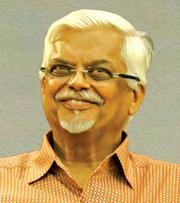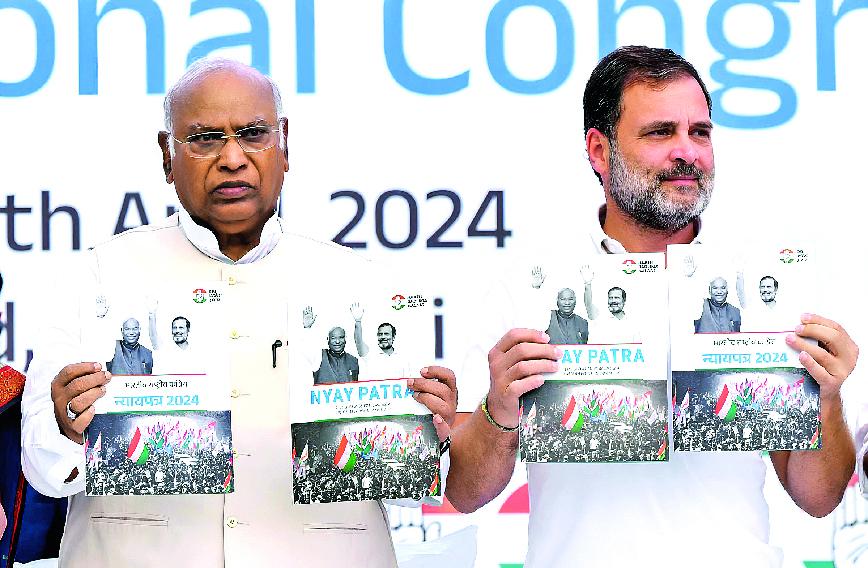
SANJAYA BARU
RESPONDING to the 2024 election manifesto of the Congress party, titled Nyay Patra, Prime Minister Narendra Modi said it bears the imprint of the Muslim League. That more or less sums up the political platform of the Bharatiya Janata Party (BJP) under Narendra Modi’s leadership. As the major opposition party, the Congress draws attention to all the inequities and injustices that have come to characterize the development process in India. As the main ruling party, the BJP defends its record in the name of religion.
What is striking about the political narrative around the elections is that there is so much in common between the Congress and the BJP when it comes to economic, foreign and national security policy. Both criticize each other for their acts of omission and commission. Both can be accused of promoting crony capitalism when in power. Both have, by and large, pursued a similar foreign policy. Wherein lies the difference? It revolves around three central issues.
First and foremost, their approach to religion is fundamentally different. For all its faults and the many compromises it made with communal politics, the Congress remains a political party of all religions. The BJP under Modi has made it clear that it is first and foremost a party of the Hindus. Citizens of minority faiths will live at the mercy of the majority. So, there will be a token Sikh in the Union Council of Ministers, but no Muslim minister. A token Muslim, that too from Kerala, and a token Christian will figure in the list of close to 500 members contesting in these elections. Gestures of goodwill will be made towards minorities but the message is clear, Bharat belongs to the Hindus and minorities will live at their sufferance.
The second issue that sets the BJP and Congress apart is that the latter has come to terms with India’s federal character after its decade in office as the head of a coalition, the United Progressive Alliance (UPA). The Congress manifesto devotes an entire chapter to ‘federalism’, declaring that “Federalism is the foundational principle of an India that is a ‘Union of States’.” India’s “fabric of federalism”, says the Congress, “has been systematically destroyed by the BJP/NDA government. Congress affirms its belief that India cannot be administered by the central government alone. In most matters concerning the daily lives of the people, it is the state government that is close to the people and, in some matters, it is the local government (panchayats or municipality) that is closer to the people.” Modi’s BJP rejects this view of the Indian Republic and nationhood. ‘India is Bharat’, for the BJP. A unitary formation defined by Hindutva.
A third issue that distinguishes the Congress from the BJP is language. While in the past even the Congress tried to impose Hindi, attracting a defiant response from the Tamils, it soon backed off and allowed Hindi to spread quietly and slowly across the country through popular use. Hindi/Urdu/Hindustani cinema played its part, so did the education system and finally large-scale migration of labour from Hindi states to the non-Hindi ones. There was a light touch to the Congress approach to the adoption of Hindi across the country. The Modi-Amit Shah-J.P. Nadda BJP has pursued an ‘in-your-face’ imposition of Hindi. Look at the language of the Bharatiya Nyaya Sanhita (BNS), the Bharatiya Nagarik Suraksha Sanhita (BNSS) and the Bharatiya Sakshya Adhiniyam (BSA).
On most other issues one could say that the views of a political party in power and those of one in opposition are bound to differ but their approach to policy may not differ as much. In office the BJP has proved to be no different than the Congress. Of course, there is a difference between the Modi BJP and the BJP we saw during Atal Bihari Vajpayee’s term in office. Vajpayee governed with a light touch. Modi does so with a heavy hand. Those of us who lived through the Emergency period of 1975-77 have seen what unaccountable governance means. Modi has, of course, gone several steps beyond Indira Gandhi in using the official instruments at his disposal to deal with political opposition.
Some critics have pointed to the fact that the Congress under Rahul Gandhi’s leadership has moved far too much to the political ‘left’, abandoning Manmohan Singh’s more business-friendly approach. This is a superficial reading of the Congress’s renewed socialist rhetoric. In a deeply unequal society like ours it is quite natural for the ruling class to mouth socialist rhetoric to gain public support. Every political party speaks that language. One must go beyond rhetoric and see how actual policy is implemented. In power, the BJP’s economic policy preferences and priorities have not been very different from the Congress, rhetoric apart. The language in which they are wrapped and marketed may be different, but the direction of policy is no different.
So what then constitutes the essential difference between the two national parties? Some say the Congress is dominated by one family. But the BJP too is today dominated by two persons. If Sonia Gandhi and Rahul Gandhi are the final arbiters in the Congress, Modi and Shah are the final arbiters in the BJP. So this ‘parivaarvad’ argument no longer sounds very convincing. We see a centralization of power in all political parties. Perhaps the Communists are the only exception to this rule.
In the end the choice is between the ‘Hindu-Hindi-Bharat’ view of the BJP and the ‘India is a Union of States’ and ‘Unity in Diversity’ view of the Congress. These are larger issues of national identity that cannot be easily translated into winnable agendas in an election. So the electoral rhetoric will be along familiar lines. The voter has to go beyond the rhetoric to understand and secure the nation’s future.
Sanjaya Baru is a writer and Distinguished Fellow at the United Service Institution of India
Comments
-

Sumedha Prakash - May 6, 2024, 1:47 p.m.
"BJP’s economic policy preferences and priorities have not been very different from the Congress, rhetoric apart. The language in which they are wrapped and marketed may be different, but the direction of policy is no different." I learnt a lot from this article overall. Much needed around election time, thank you!




